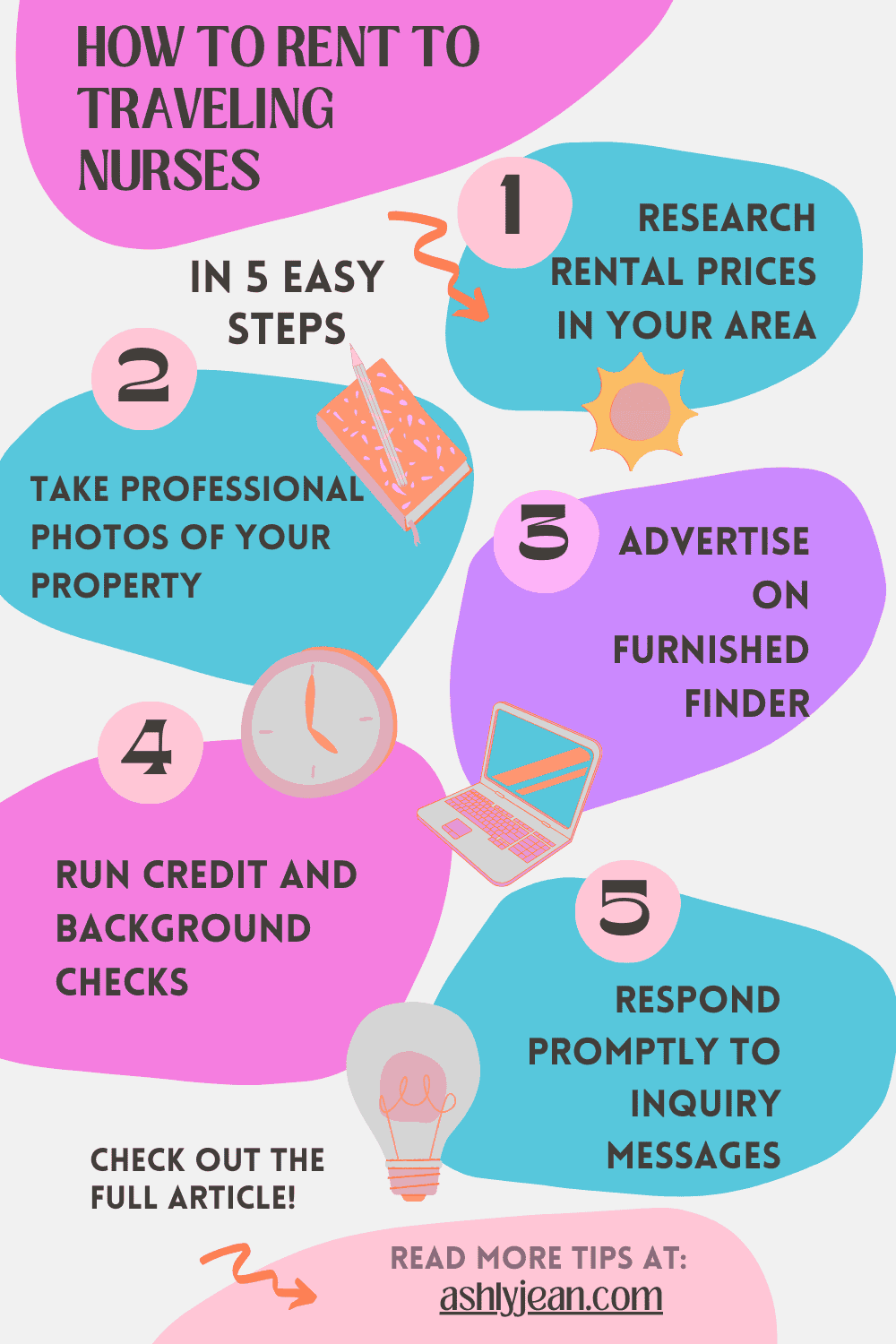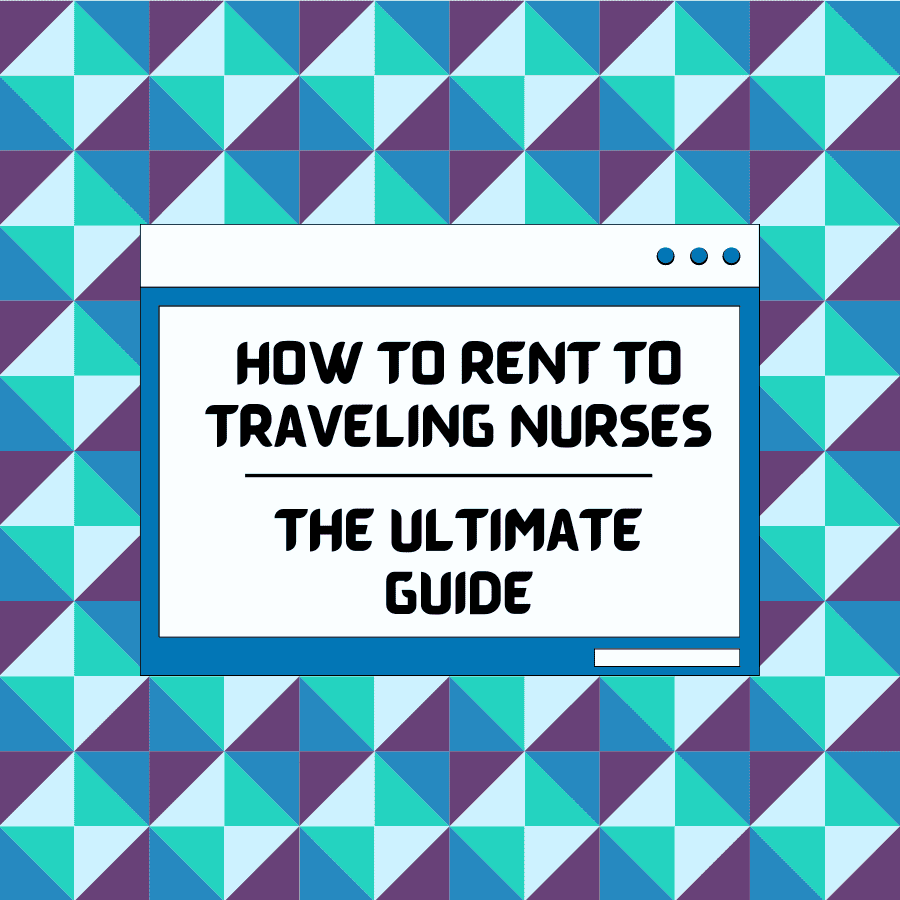Renting to traveling nurses is a great opportunity for homeowners and landlords looking to generate steady income from their properties.
These healthcare professionals are constantly on the move, often working 13-week contracts, and they need a safe, comfortable, fully furnished, short-term rental.
In this ultimate guide, you’ll learn everything you need to know, including insider tips, for how to rent to traveling nurses — from setting your rates to furnishing your space and advertising on the right platforms.
How to Rent to Traveling Nurses: A Step-by-Step Guide
Renting to traveling nurses may seem daunting, but with a clear, organized approach, it’s a great opportunity for property owners to generate steady rental income.
Travel nurses typically seek flexible, fully furnished housing that caters to their short-term assignments.
By understanding their needs, setting competitive prices, and ensuring your property is move-in ready, you can attract reliable tenants.
This step-by-step guide will walk you through the process of preparing your travel nurse housing and securing your first rental.
1. Research the Market: What Do Traveling Nurses Look For?
Before diving into listing your property, it’s important to understand the housing needs of travel nurses.
They generally prioritize:
- Flexible lease terms (short-term lease, month-to-month lease)
- Fully furnished units
- Proximity to hospitals and clinics
- Reliable Wi-Fi, all utilities included, and amenities like laundry and parking
Knowing what traveling nurses want helps you tailor your rental to attract the right tenants.
Pro Tip: Research similar rentals in your area on Furnished Finder to see how other landlords price their rentals and what amenities they include.
2. How Much Can You Make Renting to Traveling Nurses?
The income potential from renting to traveling nurses can be quite lucrative.
On average, landlords can charge between $1,500 and $3,000 per month, depending on location and property features.
Travelers are often reimbursed through a housing stipend by their agencies, so higher rent prices may be more acceptable than traditional long-term renters.
You can refer to this post on How Much Can You Make Renting to Traveling Nurses to learn about regional rates and profit margins.
3. Furnishing Your Space for Traveling Nurses
Travel nurses typically want to rent a fully equipped home.
Check out my Amazon storefront designed specifically for property owners.
Here’s what you need to consider:
The Essentials:
- Bedroom: High-quality mattress, bedding, comforter, and storage
- Living Room: Comfortable seating, TV with streaming capabilities, wifi
- Kitchen: Full cookware set, utensils, coffee maker, and an air fryer
- Bathroom: Towels, sink topper, storage
Bonus Features:
- Wi-Fi: A must-have, especially for travelers who need reliable internet for work
- Laundry: In-unit or easily accessible laundry is highly desirable (don’t forget a laundry hamper)
- Parking: Offering secure, easy parking can make your rental more attractive.
For more tips, check out my post on Travel Nurse Housing Design, where I dive into how to create the perfect setup for traveling professionals.

4. Where to Advertise Your Rental Property
Advertising on the right platforms is key to reaching traveling nurses.
Here are the top websites where you should list your rental:
- Furnished Finder: Tailored for traveling nurses, this platform is a top choice. Create a detailed profile with photos, rental rates, and amenities to attract the best tenants.
- Airbnb: A great platform for short-term stays. Make sure to use clear descriptions that cater to the needs of nurses, like proximity to hospitals.
- Facebook Groups: There are specific housing groups for traveling nurses where you can advertise for free.
- The Top Travel Nurse Housing Sites: Read my post on the best travel nurse housing websites to see where we search for short-term housing.
Avail is another excellent platform that offers resources and guidance for renting to travel nurses. You can also manage leases, rent payments, and tenant applications directly through the site.
5. Screening Tenants and Setting Up a Lease Agreement
While most travel nurses tend to be trustworthy, it’s still crucial to screen them to ensure your property is protected.
Here’s what you should do:
- How to verify employment: Request proof of employment or a contract — usually just having the traveler show the first page of their contract with the assignment dates is enough.
- How to run credit and background checks: Use tenant screening services such as Keycheck through Furnished Finder or Zillow to check credit scores and criminal records.
- How to write a lease: Make sure your lease terms cater to the short-term nature of travel nurse stays (e.g., 3-4 month leases, renewable month-to-month options). Let the travel nurse decide their own dates for the lease and give them the option to move to month-to-month afterward as many travel nurses extend at their current assignments.
- Where to find a lease agreement: Many websites provide free lease agreement templates. I have used Free Forms, E-Forms, and Zillow (which you have to pay for but it’s a one-time payment and all your leases are saved in one place).
6. How to Protect Your Property and Maximize Your Income
Travel nurses can be excellent tenants, but like with any rental, protecting your property is important.
Here’s how:
- Require a security deposit: A security deposit helps cover any potential damages.
- Require additional deposits: If they have a pet, request a non-refundable deposit. You can also request an additional non-refundable cleaning deposit that will be used on a professional cleaner after they move out.
- Eviction clause in the lease: Make sure there is a clause in the lease that states if the lease agreement is broken, then you, the property manager, have a right to evict the tenant with 3 days notice. DO NOT just throw their things out and change the locks — that is illegal and they could sue.
- No smoking allowed: It is perfectly ok to say no smoking allowed. Most nurses don’t smoke anyway (we know how bad it is for you!).
- Consider renter’s insurance: You can suggest that tenants take out renter’s insurance.
- Routine checks: If possible, check in on your property in between tenant stays to keep it in good condition.
- Consider getting a keypad on the front door: Using a keypad with a changeable code for the front door is better for everyone. You don’t have to worry about the potential tenant losing their keys, and when they leave, you just change the code without having to worry about changing the locks in case they made copies of the key.
- Install external cameras: It is perfectly legal to have external property cameras that point away from the property. Just be aware that any cameras pointing towards the property, or towards the front door is very illegal. I also recommend giving your tenant access to these cameras for their own added safety and reassurance.
- Outsource to a property management company: If you live far away from your travel nurse rental or don’t have the time to do the screening, set-up, and maintenance, consider hiring a property management team who takes care of all of the above for a monthly fee.
Bonus Tips for Maximizing Your Listing’s Appeal
Take these extra steps to ensure your property gets rented.
- High-quality photos: Property listings with clear, well-lit photos get more attention. Consider hiring a one-time professional to take amazing photos of the space. Trust me, it will pay off. Since we aren’t able to see the place in person, photos are the only thing we can go by.
- Flexible check-in/check-out: Make it easy for tenants to check in, especially if they’re arriving late due to shifts. Even more reasons for installing a front door keypad — no need to be there if you can’t make it when they arrive.
- Communicate promptly: Fast responses to inquiries can make you a top choice among tenants. Keep an eye on your messages and turn notifications on. If a travel nurse shows interest, you can be sure that you aren’t the only one who they’re messaging. It is often a race of who gets back to us first when we are looking for housing.
- Check out the rental market: Look at other properties for rent in your area on Furnished Finder and see how much they’re charging, their photos, descriptions, amenities, etc. Also, feel free to send me an email asking to look over your description for an honest review by a real travel nurse.
Ready to Rent to Traveling Nurses?
With flexible leases, furnished spaces, and the right marketing strategy, renting to traveling nurses can be a profitable and low-stress option for landlords.
Follow the steps in this guide to ensure your rental stands out and provides a comfortable home for these healthcare professionals.
And as always, if you need some extra advice, feel free to leave a comment or email me, and I will gladly help you out.
FAQ
How do I market my home to traveling nurses?
To market your home to traveling nurses, list your property on specialized platforms like Furnished Finder, which caters specifically to healthcare travelers. Make sure your listing highlights features that travel nurses typically seek, such as short-term lease options, proximity to hospitals, and fully furnished spaces. Use high-quality photos and detailed descriptions of the amenities.
How much should I spend on housing as a travel nurse?
As a travel nurse, it’s common to follow the “one-week rule,” meaning you should spend about the equivalent of one week’s pay on your monthly housing costs. This ensures that your housing expenses remain manageable while allowing you to budget for other essentials.
What is the best travel nurse housing website?
The most widely used travel nurse housing website is Furnished Finder, which specifically caters to the traveling healthcare professional. Other top travel nurse housing websites are AirBnb, Zillow, and VRBO.
Disclaimer: I may earn commissions from purchases made through the links in this post at no extra cost to you.
